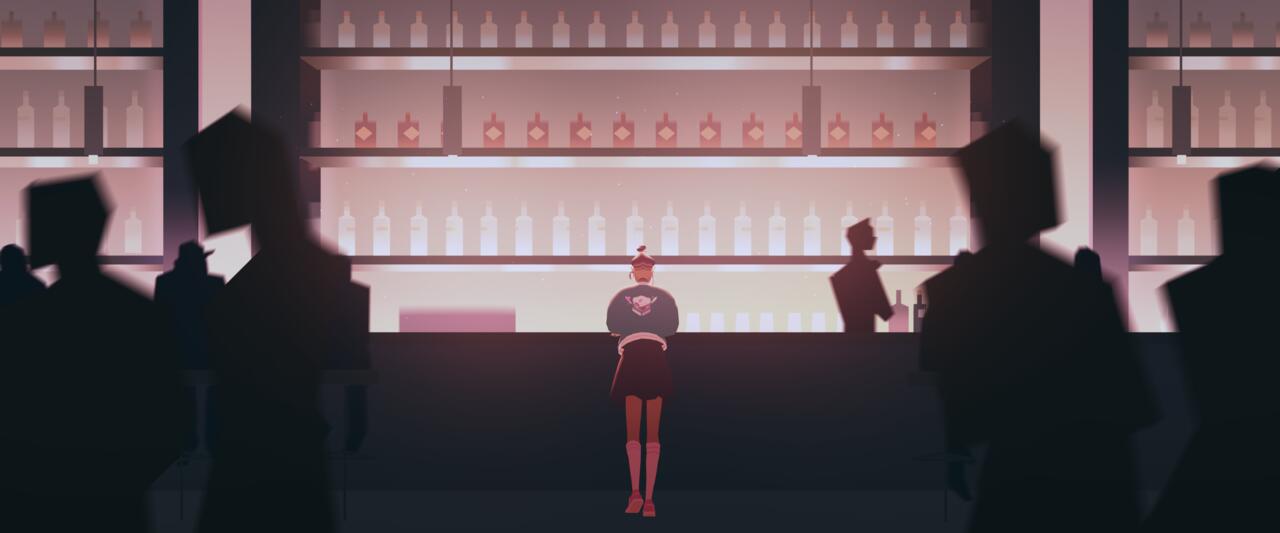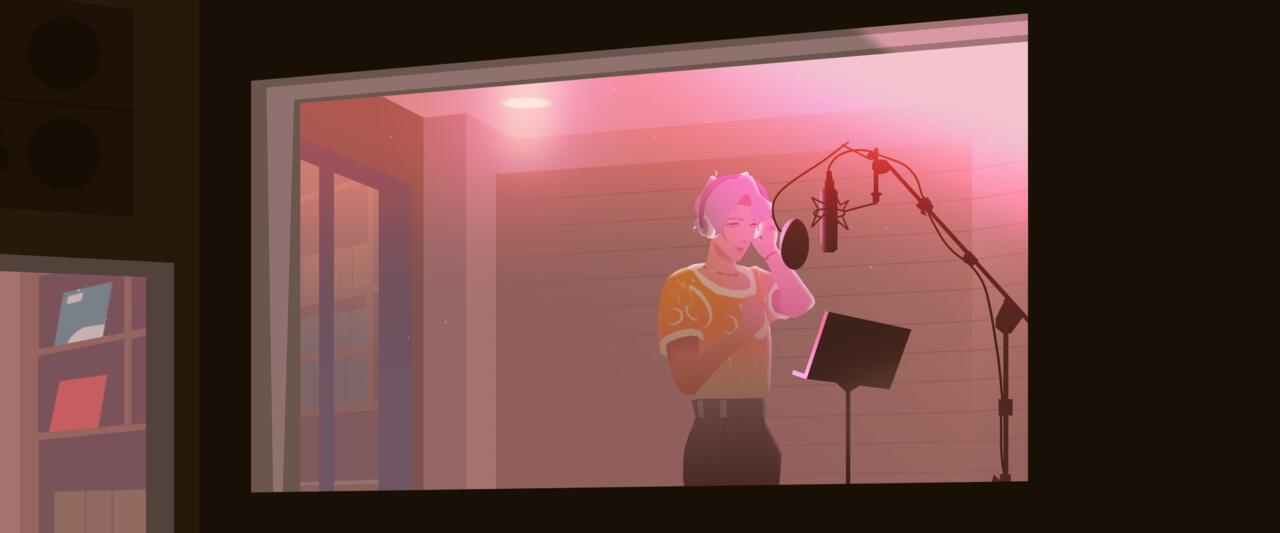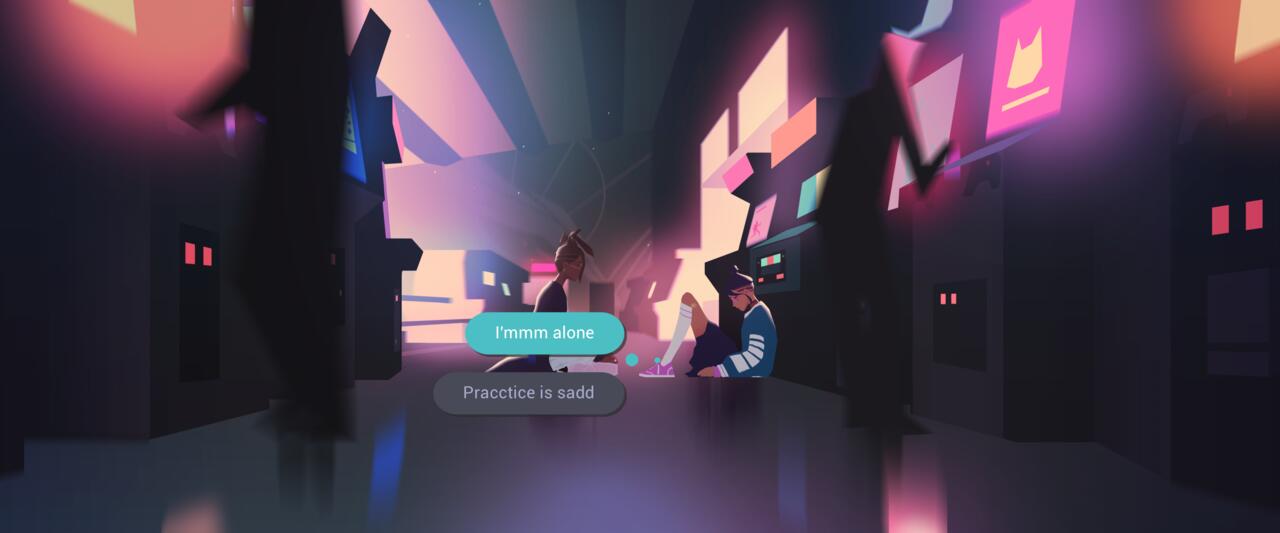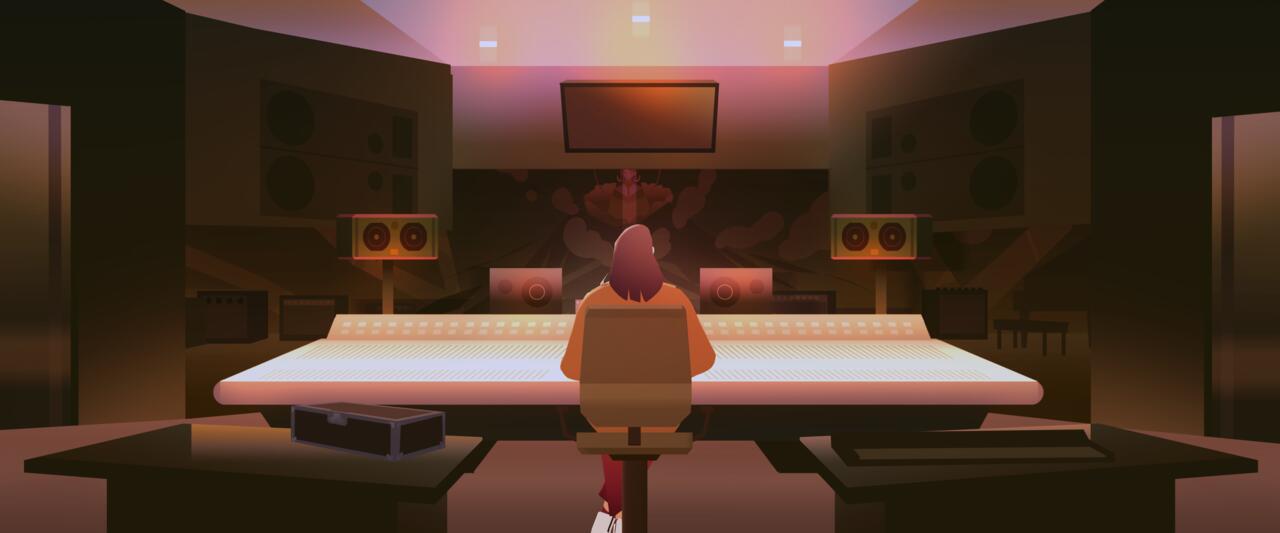We Are OFK has a really cool premise. Mixing together the notes of a visual novel and a biopic, it is the origin of a band known as OFK--their first single, Follow/Unfollow, debuted during The Game Awards 2020 while the rest of the group's first EP will release over a five-week period later this year.
OFK is a real band, albeit one that features virtual members. This isn't a case where developer Team OFK is making a music-based game and subsequently releasing the soundtrack. The team has designed OFK in the same vein as other virtual music artists and groups, like Hatsune Miku or K/DA. We Are OFK is the "televised" biopic of how the group's four members--pianist Itsumi Saitō (Ally Maki), singer/songwriter Luca Le Fae (Teddy Dief), audiovisual artist Carter Flores (Syhaya Aviel), and producer Jey Zhang (Fiona Rene)--became a group in the first place.
"[We Are OFK] started as a game project that was meant to be about what we know--a story about people making things and trying to just get shit done in Los Angeles, with focuses on friendships and relationships," creative director Teddy Dief told me. Alongside being the voice for OFK's lead singer, Dief also helms the creative direction of the studio behind the band's biopic.
"But we didn't want to make a game about people making games," they continued. "It made a lot of sense to do music because our producer at the time had a background in music business and she knows her way around the industry. And I have a vocal background. So we were like, 'Oh, we can put something together where we could actually, from the beginning, make a professional music project that isn't just a traditional video game soundtrack.' Like we could actually do a proper band and then tell their story."
Though We Are OFK started as a game, Dief hopes that that isn't how most people first experience the project. "In terms of how we talk about the project and want people to experience it, the coolest scenario is people hearing the first single on the Spotify app, and then they go, 'Oh, shit. There's also a biopic about this band.' That's way more interesting to us, and how we want to relate to people--the band first and the stories second."
This scenario isn't a novel concept--there have been fictional biopics for plenty of real musical artists and bands, such as The Monkees and Big Time Rush. As far as I can tell though, this is the first time such a story is being told for a band composed of virtual people as well as the first time such a story has been told through the lens of an episodic video game as opposed to a television series, thus inviting the viewer to participate in the narrative.
I got a chance to play the first episode of We Are OFK, which introduces all four members of the group but primarily focuses on the perspective of Itsumi. It's a very dialogue-driven opening, forgoing stilted exposition in order to move the action along at a compelling pace. I managed to catch snippets of characterization that briefly appeared at the bottom of old cell phone text chains before new messages pushed them out of frame, and dialogue options provided insight into how a character was feeling, regardless of which choice I picked--all of which felt like a more natural way of introducing me to these characters than a detailed account of their backstory. I was rewarded for paying attention instead of having details just being spoon-fed to me.
By the end of the episode's 50ish minute runtime, I was hooked and eager for more. Episode 1 feels like an excellent TV show pilot, which makes sense given We Are OFK writer Claire Jia's history penning for television--previously, she's written for TV series Awkwafina Is Nora from Queens and Fresh Off the Boat.

In continuing that TV connection, We Are OFK is being released like a televised series. When the game launches, players will only be able to access Episode 1, with each subsequent episode releasing on a weekly schedule. Each of the five episodes will also mark the release of a new single from OFK, all of which will debut on digital music storefronts.
"And weekly releases are a thing in music as well," Dief added. "Our record label person and our manager both said, 'You should give them weekly releases--that's what works best on music platforms.' So it all can be congealed together--weekly releases make sense for TV, and it makes sense for the songs too."
But what about the game itself? Team OFK describes We Are OFK less as a game and more as an "interactive experience," which seems apt based on what I played--it features moments of gameplay, but it plays out a lot more like a television show with interactive elements. It's very Kentucky Route Zero in how everything plays out, though with a far brighter color palette and characters who'd fit more at home in something like Life is Strange or Persona.

The story begins with Itsumi in the midst of an emotional and mental downward spiral. With over a decade of experience playing the piano, Itsumi is trying to make it in Los Angeles, but she's barely scraping by on her meager salary working for a game developer, and folks aren't lining up to secure her for paying gigs--she's only had a few offers, none of which have led to a big break. She's burnt out, struggling to find the joy in practicing music while her ex is badgering her with unsolicited text messages.
Itsumi's struggle is a relatable one--it's here that We Are OFK's first episode finds its greatest strength, and I hope it's one that continues throughout the game's other four. Even if you have no connection to the music industry or knowledge of how it works--like me--We Are OFK's story is still approachable. Its plot is built around themes that are easy to understand regardless of your passions. These aren't folks struggling with celebrity stardom or stressing about hundreds of pages of contracts--in We Are OFK, Itsumi, Luca, Carter, and Jey grapple with imposter syndrome, heartbreak, the unwanted thoughts that you should fill free time with practical activities that are productive, and what it's like to transform what you love into the career you need to do in order to make enough money to live comfortably.
"I think that those experiences transcend the medium," said Dief. "My background in music is one of the reasons why we did it the way we did it. Like I sing the songs. And in terms of the writing process, we definitely did have a lot of conversations with our producer Mikayla Foote--who comes from music and artist management--and then set up a lot of phone calls with both people we were working with on the music side, like our songwriter.
"But as much as we could, we went, 'Hey, what is it like to do your job and what sucks and who makes your job hard?' It's not like in Episode 2, [the characters] are going to spend the whole episode in the studio. That's not actually interesting to watch. Most of the time you're just sitting there. It's more interesting to follow what's happening right before and right after [those moments in the studio]." According to Dief, those are the moments that people will more easily relate to.

And they're right--I walked away from the We Are OFK preview feeling like Team OFK had researched my own life for inspiration in constructing the game's narrative. As I imagine most folks in their mid-20s to early-30s who pursued careers in writing, music, art, or other creative fields may feel after playing through the first episode of We Are OFK. It certainly doesn't pull any punches when diving into the struggles that such a career can have--I teared up a bit listening to Itsumi confide in Carter as to why she's struggling to keep practicing piano (an emotional scene that should be experienced firsthand), and I nodded in deep understanding when Luca tried to explain to his friends that he was working at a company that made him miserable because it not only paid alright but because it offered health insurance that he needed.
"There's no traditional villain because everyone is very flawed and everyone eventually works each other in different ways," writer Claire Jia told me. "Even people that we set up as very innocent or incapable of hurting others can eventually reveal themselves to have made mistakes as well. We just really wanted it to feel like when you're working on things with your friends and it oftentimes is not a situation where someone is purposely doing all the wrong things and is the bad guy, it's just that sometimes people are incompatible or they're not speaking their truth necessarily or being vulnerable enough with each other. So that leads to miscommunications."
Dief added, "I agree with Claire, the interesting conflict is that you are trying to make something with a bunch of other people who have their own priorities and needs and wants and wishes for the project and things that are distracting them. And that's what creates the [conflict] that we actually want to talk about."

Like a visual novel, most of what you're doing is selecting how characters respond in text messages or conversations. Your decisions don't alter the overall narrative--no matter what choices you make, Episode 1 is always going to end in the same way. But your choices can inform the relationships of the characters. Each option reflects one of the varying thoughts in the character's head--it's up to you to decide what they actually type out/say out loud. This will, in turn, dictate how the other characters respond.
As stated before, Episode 1 focuses on Itsumi, but you occasionally jump into Luca's perspective too. According to Team OFK, each of the episodes will focus on a different member of the band, but you'll regularly switch between multiple characters, occasionally even participating in one conversation from both characters' point-of-view.
"We switch perspectives with each episode," Jia said. "Each episode takes place chronologically after the other, but we wanted you to see the events play out through different people's eyes and even though this is a game, it's also a series, and we love the idea of this like TV-esque release structure where you're playing one episode and then waiting for the next episode.
Also, the episodes themselves follow [the passing of time], like the second episode takes place roughly a week after the first episode. We wanted the game to be very hyper realistic. So as you're playing it, you are in there living with them. In the same way that they have to wait, you have to wait as well."

It's a bit too soon for me to say that We Are OFK doesn't have much in terms of gameplay--it could be way more game-like than I'm giving it credit for. The one part of We Are OFK that looks to be most interactive and video game-like is also the only aspect I wasn't able to try: the music videos. Each episode introduces one of OFK's first five songs, and you'll have some control in how the music videos for these songs play out. The music videos weren't ready in the build I played, but I did get to see how they might work in a video, and Dief described how each features different gameplay.
"We really did sign ourselves up for making five extra video games," Dief said. Unlike most music-focused games, We Are OFK won't test you on your rhythm or ability to memorize the notes of a song. As Dief describes it, the music video sections are designed more around the idea of "making you feel musical." You can't mess up and enter a fail state.
"And the interactions are all totally different," Dief continued. "There's one just where you're doing a bunch of destruction because it's like a very aggressive song. There's one that features a little island builder, because there's a creative element to it. But they're all meant to be playful and make you feel involved in the music, which is what this whole thing is about--us trying to be like, 'Hey, we have this band and this music and we want you to be involved with it.'"
Jia added, "We definitely are striving to really put you in [OFK's] shoes. So the music videos are very much of the emotion of whatever the character is feeling in that specific moment. [Dief] mentioned before the destruction one where one of the music videos comes in during a really emotionally salient moment and the music video is what the player chooses to do in that emotional moment. It's all about destroying because that's what the character is going through in their mind as well. It's similar to the dialogue choices--our interactivity is less about deciding how you can change everything, and more like, 'Oh, there are a couple of things you can say.' And then it might affect the situation in a small way--sort of like a conversation in real life, the subtle ways in which you respond to someone and change the way that someone thinks about you or responds."
We Are OFK's music is a collaboration: OFK's EP is composed from the combined talents of Dief and songwriter/producers Luna Shadows and Thomas Powers, while We Are OFK's score is composed and performed by Omniboi. Episode 1 features a lot of soft rhythmic beats--it's got a relaxing dream-like quality to it. I like it, though I'm hopeful we get to see a larger variety of stylistic choices throughout the course of the game as the members of OFK experiment and try to find their respective identities in the musical world.

Though We Are OFK isn't even out yet, I did ask Dief and Jia about the future of OFK. Once the game and all the songs are out, what's next? Do we get another game continuing the band's journey? Or does OFK release more music? Short answer: It could be both.
"Claire and I talk about this, and people go, 'Oh what's next?' or, 'When it comes out, then what happens?' and, well, it depends. If the band takes off, then the band is going on tour," Dief said. "But maybe someone is like, 'Oh I want you to make more series or do DLC,' Like, it's both--every day it's both.
And since we're workshopping the future as a project right now, I feel like the band needs time. Like they need time to play shows and live and do all that stuff before we would even want to tell the next stage of the story, because the whole idea--without spoiling--is that the story [of We Are OFK] is not supposed to get into the future [of OFK]."
So I guess we'll just have to wait and see what the reception to OFK is like. We Are OFK is scheduled to launch sometime this year, releasing for PS5, PS4, and PC. If you're searching for more indie games to look forward to, check out our list of 27 games in 2022 you shouldn't overlook--one of which is We Are OFK.
January 31 update: A previous version of this article mistakenly noted We Are OFK's entire soundtrack is composed by Teddy Dief, Luna Shadows, and Thom Powers.

